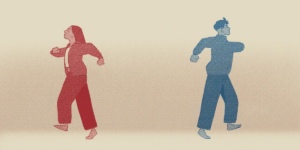The War within Gen Z
Originally published by Daniel Cox for Business Insider
Something strange is happening between Gen Z men and women. Over the past decade, poll after poll has found that young people are growing more and more divided by gender on a host of political issues. Since 2014, women between the ages of 18 and 29 have steadily become more liberal each year, while young men have not. Today, female Gen Zers are more likely than their male counterparts to vote, care more about political issues, and participate in social movements and protests.
While the gender gap is an enduring feature of American politics, at no time in the past quarter century has there been such a rapid divergence between the views of young men and women. The startling speed of the change suggests something more significant is going on than just new demographic patterns, such as rising rates of education or declining adherence to a religion — the change points to some kind of cataclysmal event. After speaking with more than 20 Gen Zers, my colleagues at the Survey Center on American Life and I found that among women, no event was more influential to their political development than the #MeToo movement.
In 2017, women around the world began speaking out about their experiences with sexual assault and harassment. Gen Zers were then in high school and college, and for them, the movement came at a formative moment. “Luckily I had that all over social media to shape the way I look at dating and men,” a 21-year-old woman told us about #MeToo. She said it allowed her “to use other people’s experiences to form a sense of putting a guard up.” A 20-year-old woman offered a similar take — that #MeToo empowered her to stand up for herself: “I think it makes me less of a doormat.”
As I’ve written previously, the #MeToo movement united women politically. Although the challenges women face vary dramatically in the US, sexual harassment is a ubiquitous experience impacting women across lines of social class, politics, age, and race. Eight in 10 women say they have been sexually harassed at some point in their lives — and addressing that reality quickly became central for women. After the inauguration of Donald Trump, hundreds of thousands of women marched on Washington in the largest single-day protest in American history.
But while women were rallying together, many Gen Z men began to feel like society was turning against them. As recently as 2019, less than one-third of young men said that they faced discrimination, according to Pew, but today, close to half of young men believe they face at least some discrimination. In a 2020 survey by the research organization PRRI, half of men agreed with the statement: “These days society seems to punish men just for acting like men.”
It increasingly feels like Gen Z men and women are living on different planets, each guided by the belief that they are navigating uniquely hostile terrain — and understanding why is crucial to bridging the gap.
#MeToo feminism
The #MeToo movement established a sense of solidarity among young women. A survey conducted in 2022 found that two-thirds of young women believe that in most or in every way, what happens to women in the US will have a bearing on their own lives — an idea known as “linked fate” in sociology. But this sentiment was not shared by older women: Only 36% of women older than 65 said the same. This bond has bled into Gen Z women’s politics, especially around issues like abortion. A survey we conducted after Roe v. Wade was overturned and just before the 2022 midterms found that no issue mattered more for young women than abortion: 61% said it was a critical concern, while only 32% of young men said the same. In the 2022 midterm elections, all young voters strongly supported Democratic candidates, but young women demonstrated much greater support than men.
